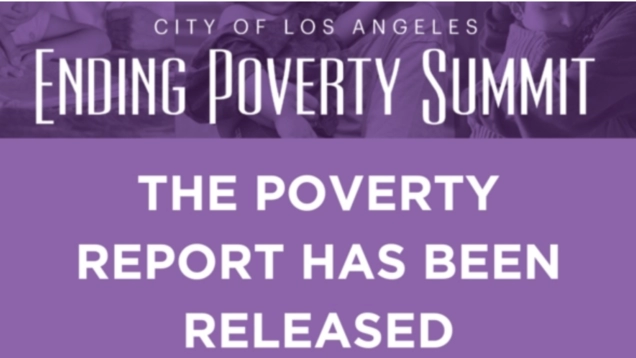
The Community Investment For Families Department (CIFD), a City of Los Angeles department dedicated to ending generational poverty, released its poverty report on Feb. 1, offering recommendations to serve Angelenos facing hardship in front of an audience of more than 100 City leaders.
CIFD General Manager Abigail R. Marquez joined City Councilmembers Eunisses Hernandez, Curren Price, Heather Hutt, City Controller Kenneth Mejia, and many others for the convening of stakeholders committed to advancing solutions to combat poverty in Los Angeles.
The report was released as a dashboard created by Neighborhood Data for Social Change, a project within the USC Lusk Center for Real Estate focused on using data to help local civic actors track measurable change.
“The report is intended as a starting point to mobilize partners and create a strategy that will move toward our goal of ultimately ending poverty in Los Angeles,” Marquez said. “It is our hope that it will hold us all accountable to measurable goals, bold policies, and innovative solutions that will help us reduce the number of Angeleos impacted by poverty.”
Among the report’s recommendations are: creating an issue-based action plan, expanding racially informed and trust-based policies, and creating a City metric that defines needs and success.
The briefing event was a follow-up to the 2022 Ending Poverty Summit that brought together over 200 representatives from various sectors and dedicated an entire day of information sharing and concrete commitments that helped to inform the initial recommendations outlined in the report.
Remarks from Councilmembers Price, Hutt, and Hernandez championed CIFD anti-poverty programs, like the Basic Income Guaranteed: Los Angeles Economic Assistance Pilot, and advocated for equity.
Mejia emphasized the importance of data and challenged legislators.
“Poverty can only be cured when legislators have the courage to properly fund the programs and services that address poverty and their root causes,” Mejia said. “I urge policy-makers here today to not just applaud these programs, but to fund them.”
Representatives from USC provided an overview of the Poverty Dashboard and fielded questions before the event concluded with a panel discussion from experts representing various fields, academia, and participants of anti-poverty programs.
CIFD is scheduled to hold its next Poverty Summit in January of 2025.